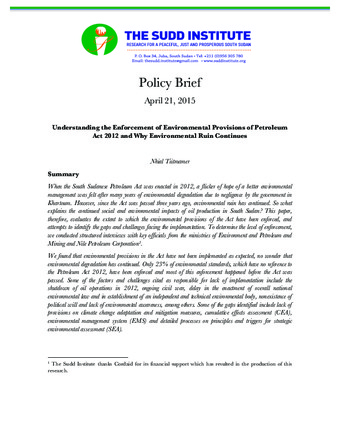Understanding the Enforcement of Environmental Provisions of Petroleum Act, 2012 and Why Environmental Ruin Continues
Publication Summary
When the South Sudanese Petroleum Act was enacted in 2012, a flicker of hope of a better environmental management was felt after many years of environmental degradation due to negligence by the government in Khartoum. However, since the Act was passed three years ago, environmental ruin has continued. So what explains the continued social and environmental impacts of oil production in South Sudan? This paper, therefore, evaluates the extent to which the environmental provisions of the Act have been enforced, and attempts to identify the gaps and challenges facing the implementation. To determine the level of enforcement, we conducted structured interviews with key officials from the ministries of Environment and Petroleum and Mining and Nile Petroleum Corporation.
We found that environmental provisions in the Act have not been implemented as expected, no wonder that environmental degradation has continued. Only 23% of environmental standards, which have no reference to the Petroleum Act 2012, have been enforced and most of this enforcement happened before the Act was passed. Some of the factors and challenges cited as responsible for lack of implementation include the shutdown of oil operations in 2012, ongoing civil war, delay in the enactment of overall national environmental law and in establishment of an independent and technical environmental body, nonexistence of political will and lack of environmental awareness, among others. Some of the gaps identified include lack of provisions on climate change adaptation and mitigation measures, Cumulative Effects Assessment (CEA), Environmental Management System (EMS) and detailed processes on principles and triggers for Strategic Environmental Assessment (SEA).
We recommend to the government and petroleum companies to (1) submit and publish past EIA, CEBS, Audit and SEA reports, (2) carry out a comprehensive social and environmental audit on the existing petroleum activities and rehabilitate the damaged environment and compensate the affected people as required by the Act, (3) speed up the finalization of the national environmental bill, create an independent and technical environmental regulatory body and give it the full responsibility to supervise, monitor and regulate environmental matters in the petroleum industry, (4) prioritize and enact regulations on EIA, SIA, climate change and emissions control, petroleum waste management, pollution damage fund, contingency fund, oil wells decommissioning plan and fund, greenhouse gases, and clean technology specifications for the industry, (5) consider amendment of the Act to include provisions on EMS, greenhouse gases limit, greenhouse gases reporting requirements, CEA and framework on clean technology specifications for the petroleum industry to reduce the industry’s negative impacts and enhance its performance, and (6) accelerate the implementation of EMS and EMP as provided in the Act and recent regulation on EMS and EMP.
Nhial Tiitmamer has served as the Director of the Environment and Natural Resources Program at The Sudd Institute where he is currently on leave to work with United Nations in South Sudan (UNMISS). He has served as an Adjunct Assistant Professor at the University of Juba where he has taught Environmental Economics, Natural Resources Economics and Environmental Sociology. Between November 2021 and November 2022, Nhial worked as Senior Environment Associate with the United Nations High Commissioner for Refugees (UNHCR) in Juba. Before returning from Canada in 2013, Nhial worked at Arletta Environmental Consulting in Calgary and at University of Alberta’s Augustana Campus in Camrose in Alberta, Canada. Nhial’s research focusses on natural resources governance, environmental protection, climate change, and sustainable energy. He was awarded in May 2023 by the Board of Directors of The Sudd Institute with Research Impact Award for policy impacts. Nhial holds a B.A. in Environmental Studies with a minor in English Literature from the University of Alberta and an M.Sc. in Sustainable Energy Development from the University of Calgary in Alberta, Canada.

